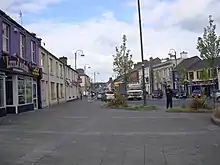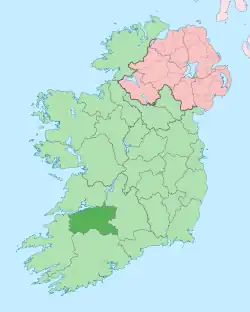Abbeyfeale
Mainistir na Féile | |
|---|---|
Town | |
 Abbeyfeale Main Street | |
 Abbeyfeale Location in Ireland | |
| Coordinates: 52°23′10″N 9°17′38″W / 52.386°N 9.294°W | |
| Country | Ireland |
| Province | Munster |
| County | Limerick |
| Local electoral area | Newcastle |
| Dáil constituency | Limerick County |
| EU Parliament | South |
| Elevation | 75 m (246 ft) |
| Population | |
| • Total | 2,023 |
| Time zone | UTC0 (WET) |
| • Summer (DST) | UTC+1 (IST) |
| Eircode routing key | V94 |
| Area code | +353(0)68 |
| Irish Grid Reference | R111268 |
| Website | abbeyfeale.ie |
Abbeyfeale (/ˈæbifeɪl/; Irish: Mainistir na Féile, meaning 'abbey of the Feale'[2]) is a historic market town in County Limerick, Ireland, near the border with County Kerry. The town is on the N21 road from Limerick to Tralee, some 21 kilometres (13 miles) south-west of Newcastle West and 16 kilometres (10 miles) south-east of Listowel and 38 kilometres (24 miles) north-east of Tralee.
Geography
The town is situated on the banks of the River Feale in the foothills of the Mullaghareirk Mountains.
History
In 1418, Thomas FitzGerald, 5th Earl of Desmond was dispossessed of his lands and deprived of his earldom by his paternal uncle, James FitzGerald, 6th Earl of Desmond, after Thomas had concluded a marriage far below his station to Catherine MacCormac of Abbeyfeale;[3] Catherine was the daughter of one of Thomas's dependants, William MacCormac, known as "the Monk of Feale."[4] A marriage between a man of Norman blood and a woman of Gaelic ancestry violated the Statutes of Kilkenny.[5]
Town

The main feature in Abbeyfeale's Square is a statue of Father William Casey. Fr. Casey was the parish priest from 1883 to 1907 and helped the tenant farmers fight against their landlords. The local Gaelic football team is named in his honour (Fr. Caseys GAA Club). Recently the town celebrated the centenary of Fr. Casey's influence by having a Fr. Casey-themed Saint Patrick's Day Parade.
The May Bank Holiday weekend sees the town host the "Fleadh by the Feale" traditional music festival. The 2009 festival was the thirteenth of these annual events. The International Bone Playing Competition is one of the highlights of the festival and is held on the Bank Holiday Monday evening on an open-air stage in the town square.

The town is known for its musical traditions, and traditional musicians such as Donal Murphy and Eibhlin Healy have lived in the town.
There was a cinema in the town, opened by the Tobin family in the 1930s designed in the classical tradition. Its demise came about with the advent of the multi-complex and it closed in the early 1990s. It is now a protected building and still stands today. The town had a dancehall, "The Abbey Ballroom", also established by the Tobin family in the 1930/1940s. Many big bands of the time played there. With the opening of the dance/pubs, it closed in the 1980s.
The town previously had an abbey, located in the centre of the town square, but this has since all but disappeared, and the only identifiable remnants are those used in the construction of the Roman Catholic Church in 1847, on the site of the current boys' national school on Church street. Church street as it is now known was originally named Chapel street, as can be seen in old-period OS maps of the town. The Geraldine Portrinard Castle (or Purt Castle) is situated about 2.5 km northwest of the town, on the north bank of the Feale.
Transport
Abbeyfeale railway station opened on 20 December 1880, but was finally closed on 3 November 1975.[6] The Great Southern Trail is a greenway rail trail that follows the route of the former Limerick-Tralee railway line between Abbeyfeale and Rathkeale.[7] Bus Abbeyfeale is served by Bus Éireann routes 13 (Tralee-Limerick) and Route 14 (Killarney-Limerick) and Dublin Coach from Tralee/Killarney to Dublin
Education
Schools include Coláiste Íde agus Iosef, a secondary school serving Limerick and surrounding counties. The boys' school is called St Mary's and the girls' school is called Scoil Mháithair Dé.
Sports
Abbeyfeale has several sporting clubs, including Father Caseys Gaelic football club,[8] Abbeyfeale United FC soccer club,[9] and Abbyefeale RFC (rugby union).[10]
Notable people
- Phil Danaher, Irish Rugby International and Gaelic Footballer (Limerick Senior team, Kerry minor team), grew up in Abbeyfeale.
- Michael Lenihan, Bishop of the Roman Catholic Diocese of La Ceiba in Honduras, was born in Abbeyfeale.
- Denis Behan, a former striker for Cork City and Republic of Ireland U23.
- Richard J. Hayes, World War II cryptographer and Director of the National Library of Ireland.[11]
See also
References
- ↑ "Census 2016 Sapmap Area: Settlements Abbeyfeale". Census 2016. Central Statistics Office. Archived from the original on 13 June 2018. Retrieved 31 May 2021.
- ↑ "Mainistir na Féile/Abbeyfeale". logainm.ie. Placenames Database of Ireland. Retrieved 4 December 2021.
- ↑ Webb, Alfred. A Compendium of Irish Biography. Dublin: 1878.
- ↑ Cokayne, George Edward, Complete Peerage of England, Scotland, Ireland, Great Britain and the United Kingdom, Extant, Extinct, or Dormant. Volume III. London: George Bell & Sons. 1890. p. 85
- ↑ "Parish History | Abbeyfeale Parish | Parish News & Information| Mass Times & Death Notices | Diocese of Limerick".
- ↑ "Abbeyfeale station" (PDF). Railscot - Irish Railways. Archived (PDF) from the original on 26 September 2007. Retrieved 8 September 2007.
- ↑ "Home". Great Southern Trail. Archived from the original on 24 July 2011. Retrieved 10 August 2011.
- ↑ "Fr. Caseys GAA Club, Abbeyfeale". www.frcaseysgaa.ie.
- ↑ "Abbeyfeale United F.C." www.abbeyfealeunited.com.
- ↑ "Abbeyfeale Rugby Club". www.abbeyfealerfc.com.
- ↑ "NLI: Richard Hayes, Library Director (1940-1967) - National Library of Ireland and the Royal Dublin Society gallery". rds.ie. Archived from the original on 4 December 2017. Retrieved 26 November 2018.
External links
- Fr. Caseys GAA Club
- Abbeyfeale United Soccer Club
- Abbeyfeale Online Archived 13 January 2016 at the Wayback Machine
- Abbeyfeale Rugby Club Website
- Fleadh by the Feale Website
- Abbeyfeale Golfing Society Archived 2018-08-25 at the Wayback Machine
